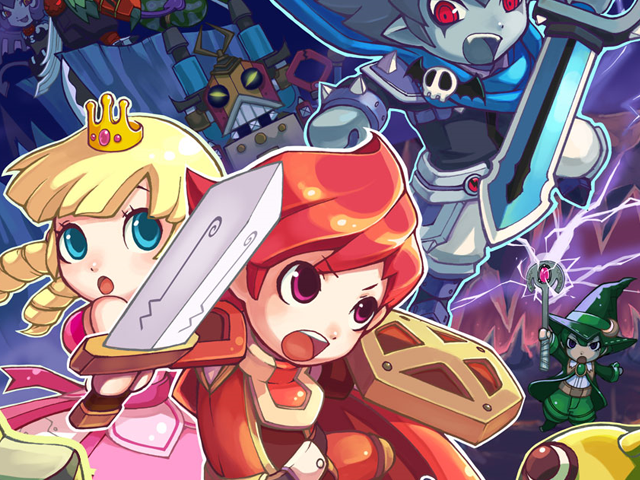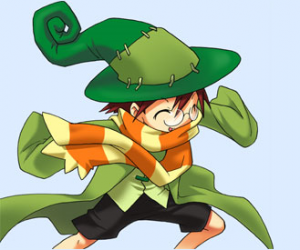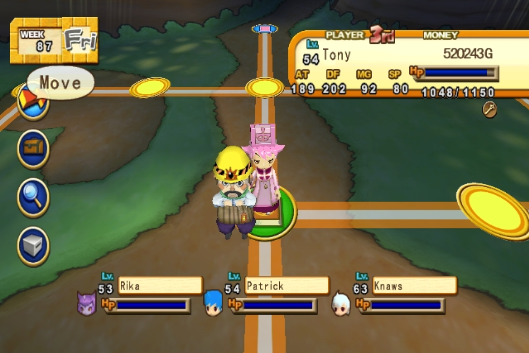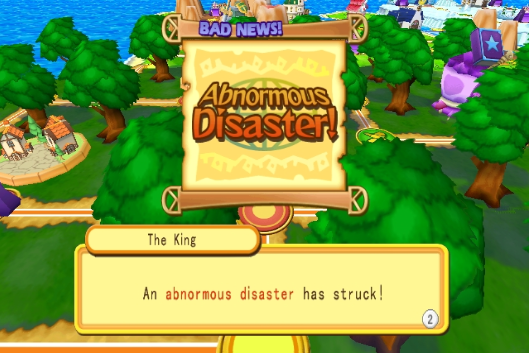
I played Mario Party once or twice back in the day, and it was pretty fun. I guess. I mean, it wasn’t one of those life-changing, revelatory, I-want-to-buy-an-Ocarina-now type of games, is what I’m saying. It’s just that Bumper Balls, as fun as that minigame was, just couldn’t sustain me for any time period longer than– let’s say– five minutes. I guess this makes me the odd man out, if Nintendo’s still making Mario Party games. (Had to look it up just now– apparently there are ten Mario Party games. And that’s not including the card game.)
 But that doesn’t mean I don’t like having fun in a group setting. It means that I need something more sustaining, something that actually satiates my jaded gamer soul. Happy games that give you stars and coins just don’t do it for me. Well, no, that’s not true– I just don’t like minigames. But give me a game like the DS Dokapon Journey or the Wii Dokapon Kingdom, and ha ha ha I’ll have fun in a group setting all you want.
But that doesn’t mean I don’t like having fun in a group setting. It means that I need something more sustaining, something that actually satiates my jaded gamer soul. Happy games that give you stars and coins just don’t do it for me. Well, no, that’s not true– I just don’t like minigames. But give me a game like the DS Dokapon Journey or the Wii Dokapon Kingdom, and ha ha ha I’ll have fun in a group setting all you want.
Of course, this kind of depends on your definition of “fun”. If Mario Party, with its bajillion minigames and happy-go-lucky characters (besides Wario and Waluigi– they always look like they’ve got some constipation problems), is your idea of “fun”, I just don’t know if you’ll enjoy Dokapon. It’s like drinking from tiny Juicy Juice boxes, and then suddenly switching over to black coffee. That’s gotta be a shock.
But I’m getting way ahead of myself. Dokapon Kingdom and Dokapon Journey, both developed by Sting Entertainment (Knights in the Nightmare, BAROQUE) and published by Atlus (pretty much every weirdo Japanese hipster video game ever), is, much like Mario Party, a video game that takes place on a board game’s board. And just like Mario Party, you can choose a character, roll a die (or a spinner in Dokapon) and move along the board, hoping to score some sweet swag. But there’s where the differences end. Unlike Mario Party, where players’ choice of Mario, Donkey Kong and whoever else is in the roster of Mario Party never really mattered, the eight characters in Dokapon actually have specific strengths and weaknesses. Whether it’s the Fighter (faster), Amazon (recovers HP), Bandit (higher dodge rating), Spy (town-raiding bonus), Mage (spell deflection), Witch (insta-Meteor), Paladin (extra defense) or Valkyrie (status recovery), players are taught from the very beginning that every choice they make in Dokapon matters– even if it’s something as simple as which character they’ll use. Though they’ll probably not want to take too much time on deciding what to name their characters. More on that later.
And so, to the Monopoly enthusiast who always chooses to use the Boot, already Dokapon doesn’t sound much like a board game. After all, hit points, dodge rating, and status recovery sounds more in the realm of role-playing games– which is, actually, exactly what Dokapon is. It’s part board game, part role-playing game, and of course this makes it one hundred percent awesome. Instead of minigames, players fight monsters (or other players, if they’re feeling adventurous), and instead of stars, players must hoard all the gold they can. The winner at the end of the game gets to wed the King’s daughter, even if you’re a girl, which is either a) lazy on the developers’ part or b) very open- or closed-minded of the developers, depending on how you see it. It’s a traditional role-playing game, true, but that tradition is subverted by the fact that it takes place on a board game. And unlike a role-playing game, all that matters in Dokapon is winning. Story takes a backseat. Far, far back.

Note the character names. Clearly, nobody’s beat up anyone yet.
But that’s not to say that there’s no story at all, because there’ll be plenty of stories to tell after even just fifteen minutes of a game. This is, of course, assuming you’re playing with other, human players– computer players can’t talk and so they’re boring. But after your first battle with a player– maybe you landed on the same spot as him, and he didn’t like it, or maybe you refused to pay your taxes (no, seriously) — and you lose, thus enabling the other player to change your name to something like “DUMDUM” (or worse), you’ll realize that the stories made in Dokapon are all of your own design. And certainly they’ll be more varied than any story made up in Mario Party. (“Oh man, remember that time when I got a star, and then I got another star, and then I got another star and won? That was great.”)
Battle itself is handled pretty simply, though, with each bout pretty much being a game of rock-paper-scissors, which I know was disappointing to me, especially after looking at all the possibilities each class could have had. But again, each class has various abilities that will help in even these silly rock-paper-scissor tournaments, and players will often be glad they (possibly randomly) chose the Fighter for his extra speed, or the Paladin for his extra defense. Though certainly some classes will have an advantage in battle, it’s evened out due to the advantages a Spy, say, has in the overworld. That said, for all its RPG trappings, battles in Dokapon can be quite disappointing.
(Though, if you get in a fight with someone on the DS version, make sure you’re friends with the players who aren’t in combat– they can see the choices the players make on the screen, and thus tell you what to pick to beat those choices. Of course, they can also help your opponent, so hopefully you haven’t named too many players “DUMDUM” and actually kept a few friendships.)
And if you don’t feel like beating people up, you don’t have to. I mean, it’ll be weird, since there’s no Banker or Multimillionaire class, but a Mage or a Spy can still go around liberating towns and exacting taxes on the resulting citizens, causing players to be able to make money even without having to take their buddies’ lunch money. In this regard, Dokapon is a bit like Monopoly— except for the fact that usually these towns will be guarded by monsters (or other players), and so even the most mild-mannered players will have to get their hands dirty eventually. Dokapon is certainly not a game for pacifists, but for loan sharks and, well, other kinds of sharks, it’ll probably be just fine.

Veterans will be afraid of these. Others will laugh, but soon they will learn.
Of course, Dokapon, like every other board game, largely depends on luck, and this shows up often in the random Mario Party-style events that show up. Whether it’s a Blacksmith who forges a more powerful weapon for you, or a crazy magician who finds a way to level you up instantly (or the other way around), random events abound, and much like in Mario Party, they’re to be feared– or, to a greater extent (I guess) desired. Oh, and don’t worry if all your gold gets stolen and redistributed due to these events. Or if all your towns disappear off the map. Or if you start back at square one. (Actually, every player is going to end up back at square one at some point, due to deaths or random events.) Another random event is sure to come over to help you out– or make things even worse. Unfortunately, since all Dokapon games take place on the same board, there are no board-specific events– well, unless we’re saying all events are specific to the only board in the game. Which, fine, is true.
All in all, though, it just doesn’t seem very sensible to compare Mario Party to Dokapon. That’s not to say they’re not on the same level– both games (even Mario Party, I admit) are great party games and do end up being kind of ridiculously awesome despite their shortcomings. (I’ll also admit that the aforementioned Bumper Balls is one of my favorite minigames of all time. Not that I enjoy minigames that much.) But for some reason, not too many people have heard of Dokapon, much less played it. It being a Sting Entertainment/Atlus game, I think we all can understand why that is– but that doesn’t mean you shouldn’t go out and try to find it. Amazon still sells both the Wii and DS versions, and both are great. (I personally prefer the DS version, but even with its support for single-card play it’s sometimes hard to find people with DS systems.) Dokapon Kingdom and Dokapon Journey are both just as quirky and crazy as you might expect from a game featuring warriors battling on a board game, and though they’re even advertised as “the friendship-destroying RPG”, they’ll probably make enough stories that you’ll keep those friendships instead.




 ShareThis
ShareThis







This story totally makes me want to track this game down and buy it. I was initially rather interested in it after we had this great Atlus interview about bringing the title stateside ( https://www.nintendojo.com/archives/interviews/view_item.php?1224632049 ) but never heard about it again. It sounds totally evil and fun.
Anything Atlus lays it’s hands on is gold. Now I want to play this game!